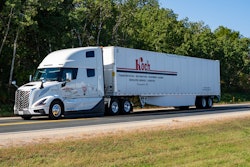A Florida bill to ban the use of retreaded tires by most trucks in the state is now a dead issue. Bill S912 would have prohibited the use of retreaded tires on truck tractors, pole trailers or semitrailers operated on Florida’s public roads, streets or highways. A required House companion bill was not forthcoming by the deadline in late March.
A New Jersey truck driver who suffered brain injuries when he slipped on an ice-covered parking lot where his trailer was parked in February 2002 has settled a negligence lawsuit against Ryder Truck Rental and a snow-removal firm for $7 million.
J. McDaniel Transportation, based in Newton, Ill., will pay a $25,000 fine to help fund natural resource restoration projects as a result of a gasoline spill from a
tanker-truck accident near McLean, Va., on April 3, 2001, that caused a four-mile fish kill in nearby Sugar Creek. Illinois Attorney General Lisa Madigan negotiated the agreement on behalf of the state’s Environmental Protection Agency and Department of Natural Resources.
Del Monte Foods Co. said an arbitrator ruled it must reimburse Pacer Global Logistics an undisclosed amount to cover hauling and fuel charges incurred on the canned fruit and vegetables company’s behalf between May 1, 2005, and April 30, 2006, that were above benchmarked rates set in a contract, plus interest.
Q We have a load of bread that was transported 1,200 miles. I would expect this normally would take three days, but in this case it took seven business days. The bill of lading did not specify a particular “delivery by” date, but would this still be considered reasonable dispatch?
A “Reasonable dispatch” is a bill of lading term that sets the legal standard for measuring liability for delay in delivery in the absence of an agreement to the contrary. The standard language on the bill of lading defines reasonable dispatch as:
“Unless arranged or agreed upon, in writing, prior to shipment, carrier is not bound to transport a shipment by a particular schedule or in time for a particular market, but is responsible to transport with reasonable dispatch.”
Under the Carmack Amendment and the bill of lading standard, you are not liable for special or consequential damages if you do not meet a delivery appointment as long as reasonable dispatch is provided. But what defines reasonable dispatch is a somewhat subjective concept that varies by circumstances and mode.
Less-than-truckload carriers have scheduled transit times that afford some standard to measure the zone of reasonableness for LTL general commodity freight. If you are transporting a commodity that you have reason to know has a limited shelf life, the term “reasonable dispatch” should have particular meaning since the shipper may be able to demonstrate loss of value through deterioration as a result of unreasonable delay.
With respect to truckload shipments, in the absence of paying extra for team service or expedited service, it seems reasonable to expect the carrier to provide direct origin-to-destination service without unreasonable delay and in accordance with the hours-of-service requirements issued by the U.S. Department of Transportation.
I have often complained about rejected produce loads because the consignee claims the carrier’s delay caused it to “miss the market” when the driver could not possibly have made the delivery within the allotted time without violating the hours-of-service safety regulations. To demand such transit times is patently unreasonable, and a carrier is correct in denying a claim caused by alleged delay under such circumstances.
On the other hand, a truckload of bread that takes seven business days to deliver to a destination 1,200 miles from origin does not sound like reasonable dispatch to me unless there is some intervening excuse. The usual and customary length of time for similar shipments is often a criterion for defining reasonable dispatch.
Subject to weather delays, a truckload carrier can be expected to cover an average of 500 miles a day with a single driver operating safely in accordance with DOT regulations. Your three-day estimate of transit time is certainly reasonable. An unforeseen breakdown and repairs might push the zone of what is reasonable into the fourth, or maybe fifth, day.
But even without a delivery appointment, seven days to deliver a load of bread – much less seven business days – seems beyond the pale of reasonable dispatch. Assuming that the bread had a limited shelf life that was compromised, I can understand why the carrier has some explaining to do and cannot simply fall back on a reasonable dispatch defense.
Clearly, a carrier must know the commodities it is transporting. And it is reasonable to expect a carrier to anticipate the damage that could be caused by protracted delay in delivering perishable commodities, time-dated material, etc. It does not seem like the carrier in this case adequately anticipated the risk or the potential consequences of its delay.
Cummins settles CARB dispute through fine, recall
Cummins paid nearly $1.1 million and agreed to recall 11,600 engines for allegedly failing to comply with its 1998 agreement with the California Air Resources Board to perform clean air projects and certify its engines to reduce smog-forming emissions, CARB announced earlier this year. “We are very pleased that Cummins is taking steps to reduce excess emissions from the heavy-duty engines in question, and that they are cooperating by instituting recalls and retiring emissions credits,” said Catherine Witherspoon, CARB executive officer.
Court allows CRST to sue Werner Dispute concerns CRST employment contract
CRST Van Expedited may proceed with its case against Werner Enterprises for hiring away CRST drivers that were bound by employment contracts, the U.S. Court of Appeals for the Ninth Circuit ruled in March. The appeals court took no position, however, on whether CRST likely would succeed as a matter of law. Rather, a three-judge panel overturned a U.S. district court’s dismissal of CRST’s complaint, saying that the Cedar Rapids, Iowa-based carrier had adequately alleged a violation of the state’s Unfair Competition Law (UCL).
The case involves two drivers who had signed employment contracts with CRST Van Expedited under which they received about $3,600 in training benefits in exchange for a promise to remain at CRST for at least one year. About a month after the drivers signed the contracts, Werner contacted CRST for employment verification as required by federal regulation. CRST informed Werner by multiple letters that the drivers were bound by contract to continue working for CRST for the balance of the year, but Werner hired the drivers anyway.
The appeals court ruled that CRST had alleged all the elements required in a claim of intentional interference with contract – the existence of a valid contract, the defendant’s knowledge of that contract, the defendant’s intentional acts designed to induce a breach or disruption of the contractual relationship, an actual breach or disruption of the contractual relationship and resulting damage.
The principal issue for the appeals court was whether the contract provided for “at-will” employment of the drivers at the time they were induced to leave. If that had been the case, CRST would have had to allege an independently wrongful act by Werner. The appeals court ruled that CRST’s employment contract provides for employment of a specified term, during which the employer’s termination rights are limited. Therefore, the contract does not provide for at-will employment during the first year, the court said.
The appeals court decision sends the case back for litigation on the merits. CRST’s complaint against Werner is essentially the same as that CRST had lodged against J.B. Hunt. A federal court in Oklahoma City in February 2006 initially ruled in CRST’s favor, but the parties settled the dispute quietly last September.








